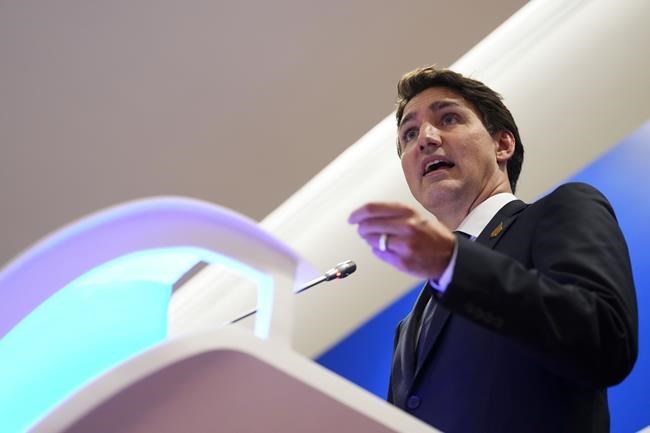SAN FRANCISCO — Its 21 member economies represent nearly three billion people and 62 per cent of the world's GDP, generating US$30 trillion in global trade last year alone.
But on Wednesday, the annual summit of world leaders from countries belonging to the Asia-Pacific Economic Cooperation coalition will, for all practical purposes, be comprised of just two people.
That's the day U.S. President Joe Biden sits down with Chinese counterpart Xi Jinping, their first in-person meeting in a consequential 12 months, in hopes of ironing out some of the kinks in their fraught bilateral relationship.
"Intense diplomacy" is how White House national security adviser Jake Sullivan describes it.
"That's how we clear up misperceptions and avoid surprises," Sullivan told a media briefing Monday. "That's how we work together where and when our interests overlap, and deliver on key priorities for the American people."
For the record, Wednesday is also the day Prime Minister Justin Trudeau begins his three-day visit to San Francisco for the APEC summit — a mission that will be focused on notching incremental trade and foreign-policy wins.
Given the stakes of what's transpiring in the global background — the Biden-Xi relationship, the war between Israel and Hamas and the ongoing conflict between Russia and Ukraine — experts say Canada can't help but keep a low profile.
"I think we Canadians are starting to make ourselves visible to as many APEC members as possible, but I think we will unfortunately play a peripheral role here," said Andreas Schotter, a professor of international business at the Ivey Business School at Western University in London, Ont.
The expanding BRICS alliance — Brazil, Russia, India, China and South Africa, to be joined next year by six new members, including Iran, Saudi Arabia, Egypt and the United Arab Emirates — has made the decoupling argument a more difficult one to make, Schotter said.
"We're seeing, I think, at best a stalling of the decoupling between the Chinese-led world and the U.S.-led world," Schotter said. In the wake of the COVID-19 pandemic, Canada is more dependent than ever on the U.S., he added.
"So it's good that we are there at APEC, but there will not be much that Canada will be able to get out of it or put into the discussion," Schotter said.
"I don't want to sound too bleak, but it's just the reality."
Canada will instead be aiming for incremental but tangible progress on its own policy priorities in the Indo-Pacific, taking advantage of what officials say will be a full slate of bilateral meetings for Trudeau while in California.
Those likely won't include a sit-down with Biden, with whom the prime minister was able to meet one-on-one at the White House just last month. But at least two bilateral economic initiatives with key Indo-Pacific partners will be on Canada's "deliverables" list, one senior official said.
The absence of Indian Prime Minister Narendra Modi also makes it unlikely there will be much drama surrounding Trudeau's allegations of a link between agents of India's government and the June shooting death of a prominent Sikh leader in B.C.
"Modi is not there, so India is not there," Schotter said.
"It's been reported as giving the prime minister a chance to avoid the discussion about the issue, but I don't think it's a good thing. I think a meeting would have been better than avoiding it."
There's still plenty of important work for Canada to do at APEC, federal officials say: It's vital to be at the table in a part of the world where the decisions that are made are likely to affect Canadians for generations.
The main goals for Trudeau include deeper collaboration with APEC nations that will foster middle-class growth and healthy regional competition, all with an eye toward advancing the fight against climate change.
Officials say Trudeau will promote new Canadian efforts to foster more efficient food production and healthier supply chains, as well as removing trade barriers with countries in the Pacific Rim.
The region accounts for about half of the world's merchandise trade, and is the destination for more than 88 per cent of Canadian exports. APEC's merchandise exports and imports alike now both exceed US$12 trillion annually.
Canada's share of that pie reached $1.3 trillion last year, an increase of 22 per cent, thanks to partners that include the U.S., China, Mexico, Japan, South Korea and Vietnam.
The summit comes one year since the Liberal government unveiled a new $2.3-billion Indo-Pacific strategy aimed at fortifying regional alliances as a hedge against China's expansive power.
This report by The Canadian Press was first published Nov. 14, 2023.
James McCarten, The Canadian Press




